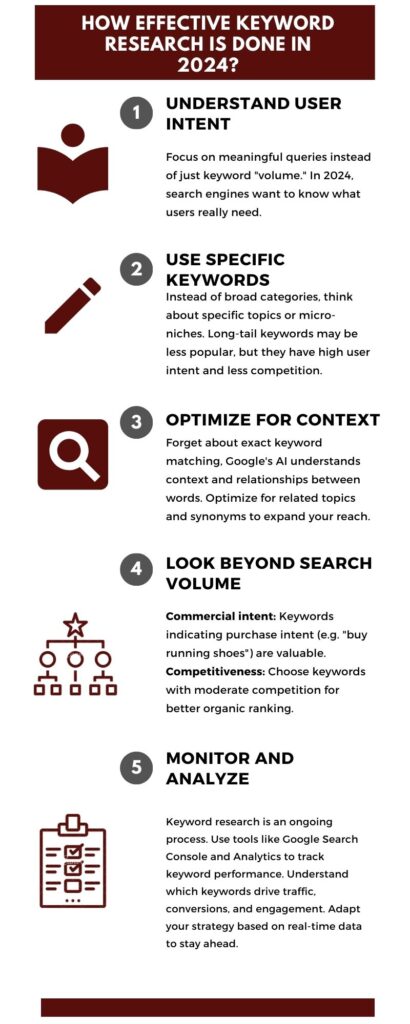Keyword research is crucial for SEO success. In 2024, it requires a simple and effective approach. Forget about generic keyword lists and robotic stuffing. Now, it is all about understanding what users want, how search engines work, and creating strategic content.

How to improve keyword research and boost your website’s visibility?
- Understand User Intent:
Focus on meaningful queries instead of just keyword “volume.” In 2024, search engines want to know what users really need.
We need to analyse that,
What problems are users trying to solve?
What information are they actively searching for?
At what stage of the buying journey are they?
Tools like Google Trends, AnswerThePublic, and Semrush can help uncover user questions and concerns. Align your content with user intent to improve your relevance and ranking.
- Use Specific Keywords:
Instead of broad categories, think about specific topics or micro-niches. Long-tail keywords may be less popular, but they have high user intent and less competition.
Use long-tail keyword research tools like Ahrefs or Moz to find specific user needs.
- Optimize for Context:
Forget about exact keyword matching, Google’s AI understands context and relationships between words. Optimize for related topics and synonyms to expand your reach.
- Look Beyond Search Volume:
While keyword volume is important, focus on keywords with high conversion potential. Consider factors like:
Commercial intent: Keywords indicating purchase intent (e.g. “buy running shoes”) are valuable.
Competitiveness: Choose keywords with moderate competition for better organic ranking.
Local relevance: If your business targets a specific location, prioritize local search intent keywords.
- Monitor and Analyze:
Keyword research is an ongoing process. Use tools like Google Search Console and Analytics to track keyword performance. Understand which keywords drive traffic, conversions, and engagement. Adapt your strategy based on real-time data to stay ahead.
Which Keyword Research Tool is Best in 2024?
To excel in SEO, you need good planning and the right tools. But with many options, picking the right one can be tricky. This blog is your guide to mastering keyword research and choosing the tool that boosts your rankings.
Available Tools:
Semrush: A big tool in SEO, Semrush offers thorough keyword research, competitive analysis, and more. It is like a versatile tool with lots of features, but it might be overwhelming for beginners.
Ahrefs: Ahrefs excels in accuracy for keyword difficulty and backlink data and is very helpful in getting high-quality backlinks. Great for data-focused analysts and agencies, but it might be expensive for smaller businesses.
Moz Keyword Explorer: Moz’s Keyword Explorer provides solid keyword research with useful metrics like keyword difficulty and search volume. It strikes a balance between features and affordability but may not be as advanced as others.
Keyword Surfer: This browser extension is awesome, offering real-time keyword data on Google search pages. Great for quick on-the-go research but lacks in-depth analysis capabilities.
Google Keyword Planner: The original keyword research tool, Google’s Keyword Planner gives free data directly from the source. However, it has limitations in competitor analysis and keyword difficulty.
Factors to consider while selecting a tool
To find the best tool, we need to consider key aspects of keyword research:
Keyword Discovery: Finding hidden gems and long-tail keywords to expand your reach.
Keyword Difficulty: Assessing the competition and targeting achievable wins.
Search Volume: Balancing high-volume keywords with relevant intent for qualified traffic.
Intent Analysis: Understanding what users are looking for to create targeted content.
Competitive Analysis: Checking out your rivals’ keyword strategies for insights.
Budget-Friendliness: Choosing a tool that fits your budget and needs.
Which tool we should select?
There is no one-size-fits-all best keyword research tool. Each option excels in its own way.
For a comprehensive SEO suite with data-driven insights: Semrush or Ahrefs are powerful but may require investment.
For a mix of features and affordability: Moz Keyword Explorer offers good value for most businesses.
For quick on-page research: Keyword Surfer is your best companion.
For free starter data: Google Keyword Planner provides a basic foundation.
